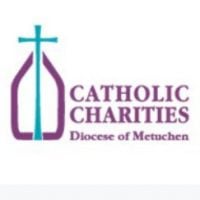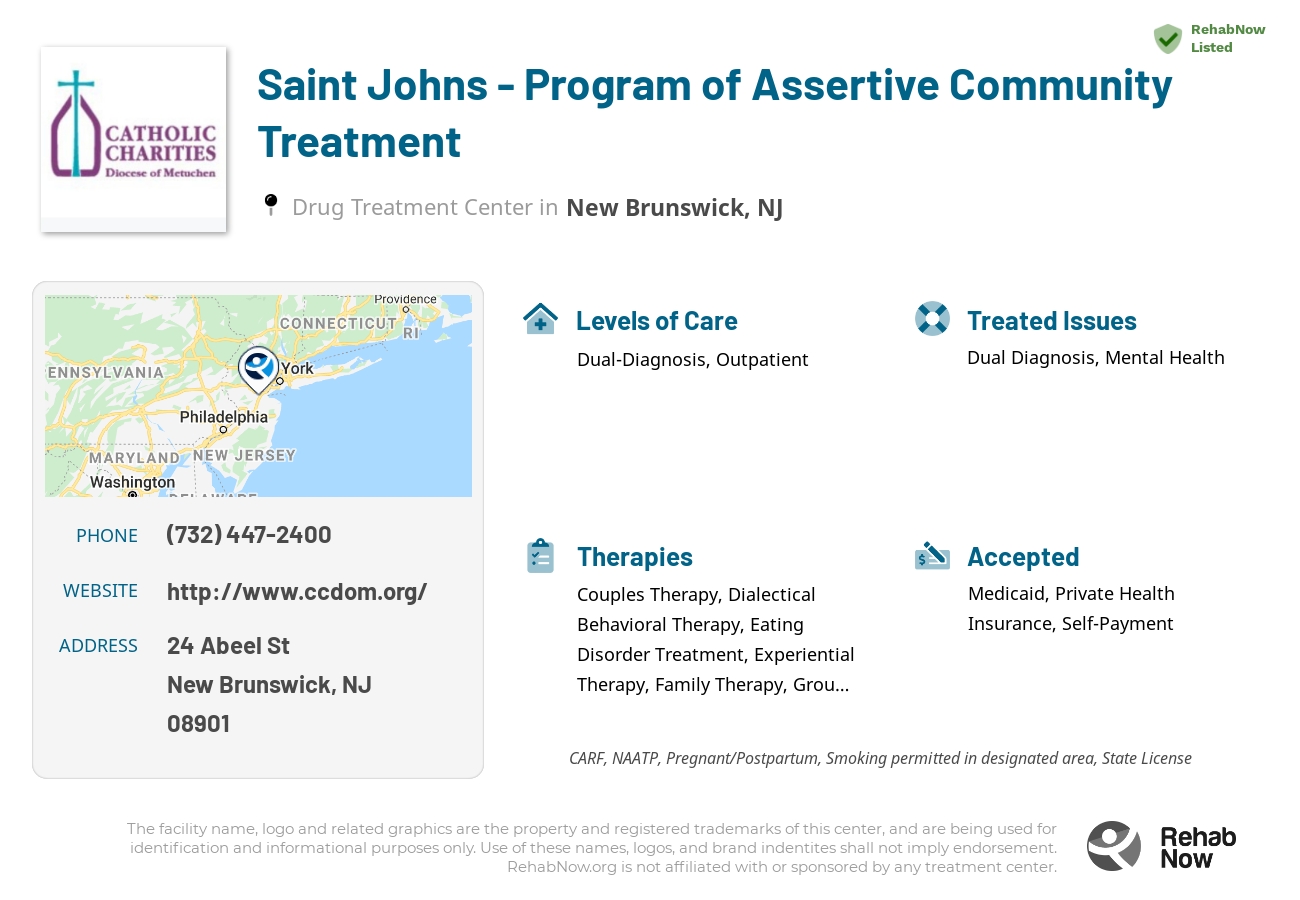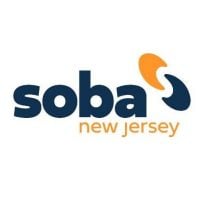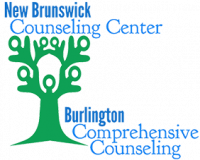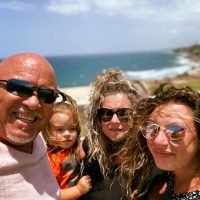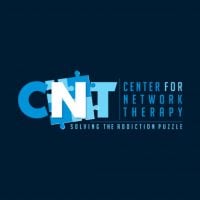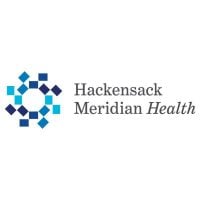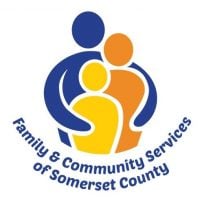Saint Johns - Program of Assertive Community Treatment
Drug Rehab Center in New Brunswick, New Jersey
Saint Johns - Program of Assertive Community Treatment (PACT) provides comprehensive support for individuals battling addiction and substance abuse, including counseling, housing, community outreach, and more, aimed at promoting wellness and recovery.
About This New Brunswick, NJ Facility
Saint Johns – Program of Assertive Community Treatment (PACT) is a charitable organization in New Brunswick, New Jersey that offers comprehensive support for individuals battling addiction and substance abuse. This program provides a range of services including counseling, housing, community outreach, and more. Saint Johns – PACT offers an individualized, continuum of care for those struggling with addiction and is aimed at promoting wellness and recovery.
Saint Johns – Program of Assertive Community Treatment provides comprehensive counseling services to individuals seeking support with their addiction. The facility also provides on-site housing options, employment skills workshops and training, medical services, family education and support, and access to a variety of resources. The program also provides social skill building and works to reduce isolation by fostering positive relationships. Additionally, they offer a number of community-based services and activities to help individuals grow and develop.
Saint Johns - Program of Assertive Community Treatment is accredited by the Commission on Accreditation of Rehabilitation Facilities and holds a license from the New Jersey Department of Human Services. The program was also awarded the Cornerstone of Care award by the National Council of Behavioral Health in 2019. The facility boasts a highly experienced staff of professionals and offers 24/7 support. Saint Johns – PACT is dedicated to helping those in need, providing a safe and supportive atmosphere for their clients to learn, heal, and get the help they need.
Genders
Ages
Modality
Additional
Conditions and Issues Treated
Mental illness includes conditions such as anxiety, depression, schizophrenia, bipolar disorder. It can also happen that mental illness causes drug addiction and vice versa. Saint Johns - Program of Assertive Community Treatment in New Jersey knows it is vital to diagnose dual diagnosis or co-occurring disorder.
Levels of Care Offered
This center offers a variety of custom treatment tailored to individual recovery. Currently available are Dual-Diagnosis, Outpatient, with additional therapies available as listed below.
To assist with alcohol or opioid abuse, or a co-occurring condition, Saint Johns - Program of Assertive Community Treatment offers an outpatient treatment program. For their rehabilitation and other services, the New Jersey patient will go to the treatment center, yet return home every night. After most of the program is completed, the level of mandatory participation reduces.
Saint Johns - Program of Assertive Community Treatment‘s Therapies & Programs
In addiction recovery at Saint Johns - Program of Assertive Community Treatment, therapy plays a significant role. This helps patients get to the root of their addiction and discover how the problems that contributed to their use can be handled better. Therapy can be performed in a group and one on one settings. The patient interacts with the therapist in a one-on-one atmosphere during individual therapy. This encourages them to reflect on the underlying addiction problems and develop ways to avoid potential future abuse.
Recovering from addiction involves recovering relationships as well. One of the most common areas of stress and damage during addiction is in intimate relationships. Couples therapy at Saint Johns - Program of Assertive Community Treatment can rebuild trust and joy that may have been damaged. Addiction involves everyone in the family, not only the addict.
Family roles can change in damaging ways that may require professional help to rebalance. Successful intimate relationships can decrease the chances for relapse by ensuring a healthy environment after rehab in New Brunswick, NJ.
Addiction and alcoholism affect the entire family. For this reason, family therapy is vital to a person’s recovery from addiction. In contrast to couples counseling, family therapy at Saint Johns - Program of Assertive Community Treatment may include siblings, children, parents, and other significant people in the recovering person’s life. Family support is one of the most important pillars of recovery.
Many people turn to drugs and alcohol as a way of processing trauma that has affected them in the past. Trauma can include abuse, neglect, the loss of a loved one and other unpleasant incidents. Trauma therapy at Saint Johns - Program of Assertive Community Treatment helps patients process trauma. It gives them the tools to deal with it in a healthier manner.
Dialectical behavioral therapy (DBT) is a type of Cognitive Behavioral Therapy that focuses on eliminating specific negative thoughts such as suicidal thoughts that can potentially lead to an individual inflicting self-harm. It is useful in the treatment of patients exhibiting uncontrollable emotions, intense mood swings, and borderline personality disorders.
The term “Dialectic” means the integration of opposites. In the substance abuse context, DBT refers to accepting the patient’s addiction and working to change their thoughts and behavior. It improves life skills such as controlling the intense emotions without reacting impulsively, resolving the interpersonal conflicts effectively, and promoting awareness about self and others.
Cognitive Behavioral Therapy (CBT) examines the relationship between a patient’s thoughts, feelings and behaviors. Saint Johns - Program of Assertive Community Treatment aims to establish a healthy response to thoughts and feelings as an alternative to turning to drugs and alcohol. It also promotes healthy communication between addicts and those around them. It is and effective therapy for people suffering with all types of addictions.
It’s no surprise that diet is a crucial player in one’s well-being. What an individual puts into his or her body becomes the fuel that drives the mental and physical faculties to perform accordingly. Therefore, nutrition therapy, also known as medical nutrition therapy (MNT), guarantees that an individual is providing his or her mind and body with proper nourishment.
The right diet can improve a person’s general outlook, sleep habits, and thought processing skills. MNT also lowers the occurrence of chronic diseases such as adult-onset diabetes. Dieticians at Saint Johns - Program of Assertive Community Treatment in New Brunswick, New Jersey believe that nutrition therapy is the key to making significant lifestyle changes, especially when it comes to personal care.Nicotine Replacement Therapy (NRTC) used products like skin patches and gum to deliver nicotine into the bloodstream of people trying to quit smoking. This helps break the habits associated with smoking. The very low doses of nicotine managed by Saint Johns - Program of Assertive Community Treatment prevent cravings while helping people make a gradual transition to complete smoking cessation.
Patient Experience
Experiential Therapy at Saint Johns - Program of Assertive Community Treatment
Experential therapy is a unique type of therapy that deals with the subconscious mind. This treatment available at Saint Johns - Program of Assertive Community Treatment in New Brunswick, NJ encourages individuals to work out their issues with their inner self through synchronous experiences.
This non-traditional treatment method makes use of the physique and encourages people to take part in various physical and emotional activities, movements, and practices. Some of the most common examples of experiential therapy are equine therapy, music therapy, adventure therapy, and role playing. Through these various methods, an individual is believed to heal from trauma, negative emotions, and hurtful memories faster. Moreover, experiential therapy is known to have enduring results which can be beneficial to sufferers.
Payment Options Accepted
For specific insurance or payment methods please contact us.
Is your insurance accepted?
Ask an expert, call (888) 674-0062
Catholic Charities, Diocese of Metuchen Associated Centers
Discover treatment facilities under the same provider.
Learn More About Catholic Charities, Diocese of Metuchen Centers
Additional Details
Specifics, location, and helpful extra information.
New Brunswick, New Jersey 08901 Phone Number(732) 447-2400 Meta DetailsUpdated November 25, 2023
Staff Verified
Patient Reviews
There are no reviews yet. Be the first one to write one.
New Brunswick, New Jersey Addiction Information
The state of New Jersey is afflicted by the rising opioid overdose crisis and the increase in the number of residents engaging in illegal substance abuse. 90% of the 2,900 drug overdose deaths in New Jersey involved opioids in 2018. Over 1.1 million New Jersey residents reportedly use drugs in a given year. High prevalence of drug and alcohol abuse caused 14% of all deaths in the state between 2008 and 2017.
About 18% of New Brunswick residents have abused drugs or alcohol in their lifetime. Heroin and opioid abuse is a major problem in New Brunswick, with over 1,600 cases reported in 2016. Some of the impacts include increased crime rates, violence, and disease spread. The best way to find a helpful drug rehab center for you is to speak with someone who has been through the process before making any decisions.
Treatment in Nearby Cities
- Medford, NJ (47.9 mi.)
- Egg Harbor City, NJ (67.3 mi.)
- Clark, NJ (11.7 mi.)
- West Long Branch, NJ (26.1 mi.)
- Keansburg, NJ (16.7 mi.)
Centers near Saint Johns - Program of Assertive Community Treatment
The facility name, logo and brand are the property and registered trademarks of Saint Johns - Program of Assertive Community Treatment, and are being used for identification and informational purposes only. Use of these names, logos and brands shall not imply endorsement. RehabNow.org is not affiliated with or sponsored by Saint Johns - Program of Assertive Community Treatment.
